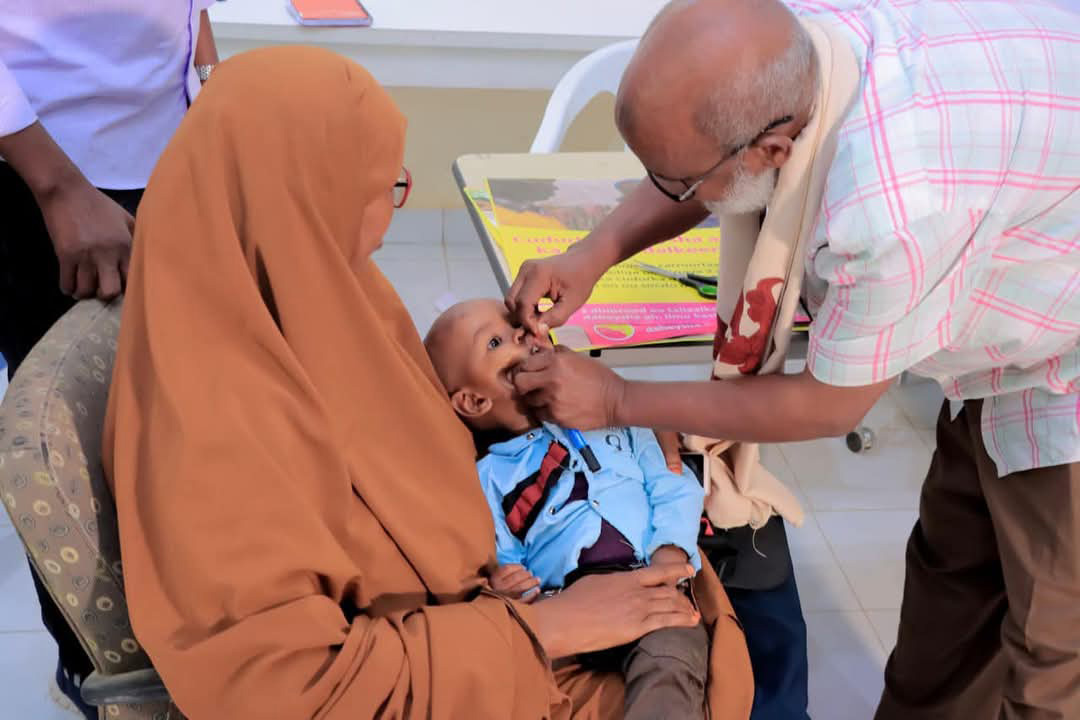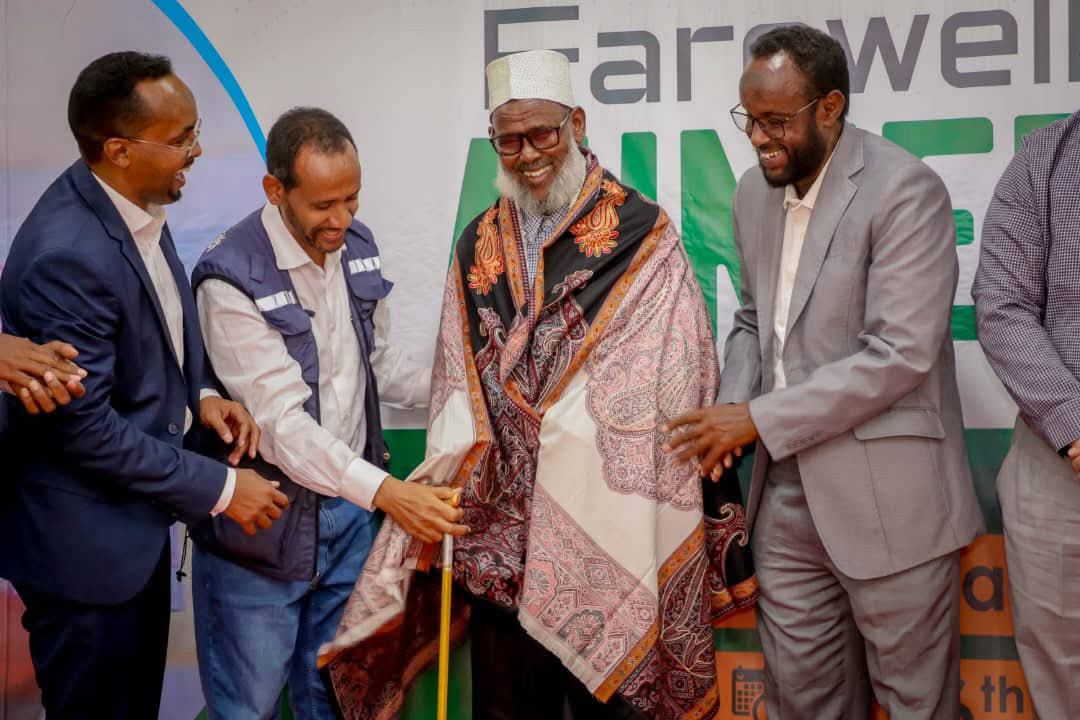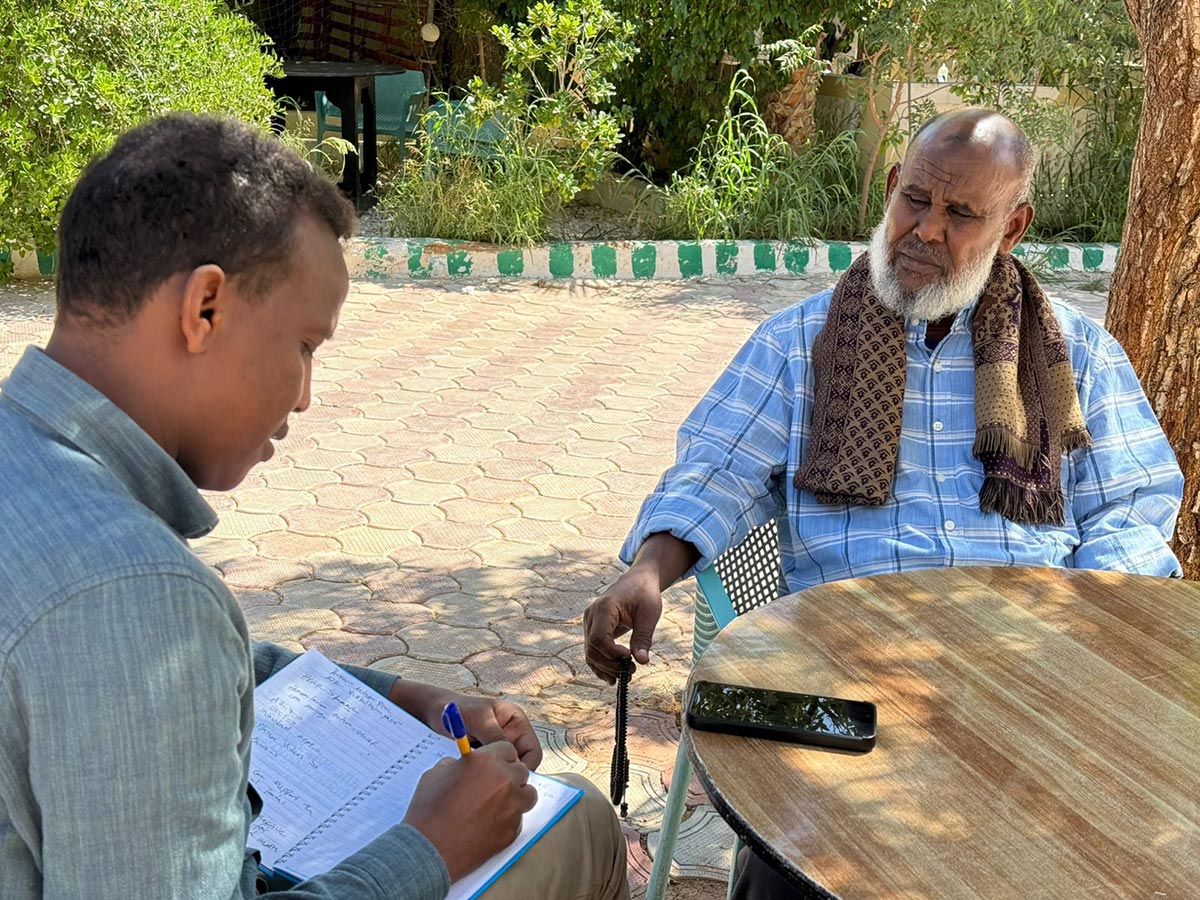 2 February 2025 – At 65, Ahmed Moalim Hirsi reflects on a lifetime of service dedicated to improving the health of people in Somalia.
2 February 2025 – At 65, Ahmed Moalim Hirsi reflects on a lifetime of service dedicated to improving the health of people in Somalia.
After 26 years as a polio eradicator with WHO Somalia, Ahmed retired in 2024, after a career characterized by resilience, dedication and impact.
Ahmed’s journey with WHO began in April 1998 in Bosaso, a city on Somalia’s north-east coast, during a time of immense humanitarian challenges for the country brought on by ongoing conflict and recurring droughts.
A graduate of the Mogadishu Nursing School, gaining a diploma in nursing, Ahmed was no stranger to serving in critical roles in health care. From 1982 to 1989, he had served families living in remote locations before joining WHO.
As part of the pioneering WHO team in Puntland, which then comprised the regions of Bari, Nugal and Mudug, Ahmed was initially tasked with polio surveillance in Bari, Somalia’s largest region. He then served as Regional Polio Officer for Bari from 2001 to 2005, and later as the Puntland Zonal Polio Officer for 19 years, leading polio eradication efforts in Puntland, mentoring teams, overcoming security challenges and ensuring that life-saving vaccines reached even the most inaccessible children.
The fight against polio in Somalia
Ahmed’s efforts have been crucial in Somalia’s fight against polio. His leadership, particularly in Puntland, has laid a strong foundation for the country’s polio eradication initiatives, resulting in a significant reduction in cases over the years.
“When I started, Somalia was in turmoil, and security and living conditions were difficult, but the need for our work was immense. We brought hope to communities by fighting polio, one child at a time.” Ahmed recalls of the early days.
Reflecting on his work, Ahmed remembers the first polio case he encountered in 1999: a young girl in Bosaso, a case of acute flaccid paralysis, later confirmed to be caused by wild poliovirus. This marked the beginning of a long, determined battle against polio.
Ahmed observes that one of the greatest challenges in the early days of his work was the widespread misinformation and distrust among communities. Misguided beliefs about the polio vaccine circulated rapidly, with rumours claiming it could harm children or stunt their growth.
“One of the hardest parts was combating misinformation and propaganda against the vaccine. People were skeptical, but through relentless awareness campaigns and community engagement, we gradually changed their perceptions. We partnered with the state government, religious scholars and traditional leaders to build trust, which eventually led to our success,” Ahmed says.
Eradicating wild poliovirus
 One of Ahmed’s most significant contributions was helping Somalia achieve official wild poliovirus-free status in 2014.
One of Ahmed’s most significant contributions was helping Somalia achieve official wild poliovirus-free status in 2014.
“We ensured that every town and village had skilled teams capable of delivering vaccines to children and women in need. We involved people who understood the community’s needs, such as district field assistants, making a significant difference in accessibility and trust,” he says.
“Eradicating the wild poliovirus from Somalia wasn’t just a success – it was a massive victory. Since 2014, there hasn’t been a single case of wild poliovirus in the country. Today, a large number of children are vaccinated, and vaccine refusal is almost nonexistent,” Ahmed notes proudly.
He emphasizes that the achievement goes beyond numbers alone, highlighting the strong system built by the government, communities and WHO Somalia as a lasting legacy.
“What we built is more than just polio eradication – it’s a strong health system that connects the people, the government and WHO. That system still stands today. I’m leaving behind not only success but also memories of teamwork and shared purpose with my colleagues, who became like family,” Ahmed concludes.
However, this success came with great personal sacrifice. In December 2010, while on a supervision mission in Bosaso, he was involved in a severe motorcycle accident that left him with injuries to his arm requiring metal implants.
“This work has not been without its risks. I still have metal rods in my arm from that accident. But looking back, the sacrifices were worth it. We achieved so much for the children of Somalia,” he says with a smile.
“His story serves as a powerful inspiration to health workers across Somalia. His unwavering commitment highlights the impact of dedication, even in the face of adversity, in transforming the lives of millions”, says Dr Gedi Mohamed, Immunization Coordinator, WHO Somalia.
Service, care and compassion beyond retirement
 Retirement has not diminished Moalim’s commitment to his community. Now residing in Qardho, Puntland, approximately 200 km from his previous workplace in Bosaso, Ahmed continues to serve those in need. Though no longer in his formal position, he remains a key figure in his community, using his skills as a traditional orthopaedic practitioner to assist individuals with bone injuries.
Retirement has not diminished Moalim’s commitment to his community. Now residing in Qardho, Puntland, approximately 200 km from his previous workplace in Bosaso, Ahmed continues to serve those in need. Though no longer in his formal position, he remains a key figure in his community, using his skills as a traditional orthopaedic practitioner to assist individuals with bone injuries.
Living with his family of 11 children, Ahmed spends his days providing free orthopaedic care to those unable to afford treatment. People come not only from Qardho but from neighbouring areas as well. His work, done entirely without charge, is a heartfelt gift to the community, motivated by his strong sense of duty and faith.
“Being a traditional bone setter is another skill I have, one that Allah has blessed me with,” says Ahmed. “I use this skill to help the people. I don't take any money for it…I consider this work as charity, and I do it for the sake of Allah.”
Ahmed’s selfless contributions remind us that even after retirement, one can continue to have a profound impact on the lives of others. His service to the Somali people stands as a testament to his unwavering dedication and compassion. His legacy endures in every child vaccinated, every community protected and the health system he helped build for future generations.
For additional information, please contact:
Khadar Hared,
Communication Officer,
WHO Somalia.
Tel: +252619800011
Email:


